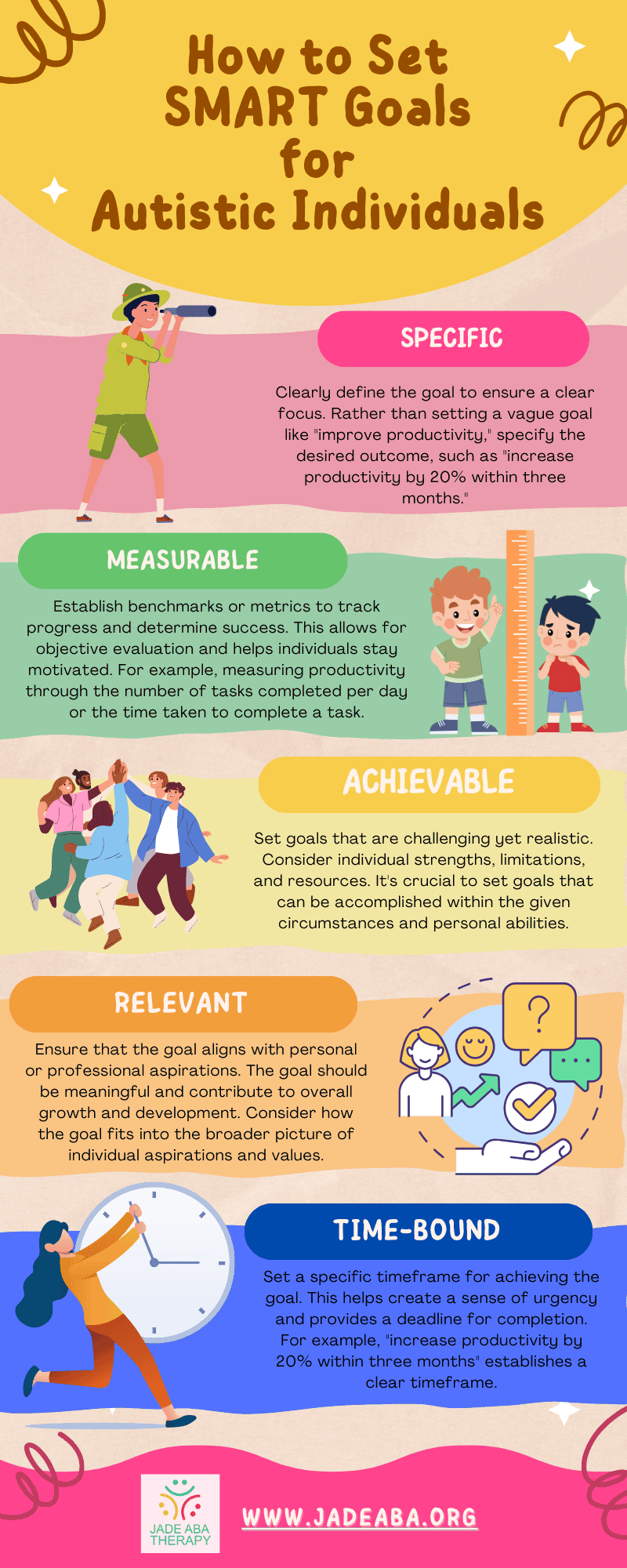Individuals on the autism spectrum tend to face unique challenges as far as time management goes. However, with the right strategies and techniques, it is possible to improve productivity and effectively manage time.
In this article, we’re going to look at various tips for autistic professionals to manage their time properly. Let’s get started.

Balance Quality and Timeliness
Striving for perfection can be a common trait among autistic professionals. While it is important to deliver high-quality work, it is equally vital to strike a balance between quality and timeliness. Setting realistic deadlines and breaking tasks into manageable chunks can help ensure that projects are completed on time without sacrificing quality.
Recognizing that perfection is not always attainable and that deadlines are an inherent part of professional life can help alleviate the pressure to achieve absolute perfection. Embracing the concept of “good enough” and understanding that perfectionism can impede productivity can be valuable in managing time effectively.
By finding the right balance between quality and timeliness, autistic professionals can optimize their time management skills and reduce stress related to the pursuit of perfection.

Use Lists for Structure
Lists can be a valuable tool for improving time management for individuals on the autism spectrum. They provide structure and help prioritize tasks, allowing for a more organized approach to work.
Here are some ways to effectively utilize them:
- To-Do Lists – Create a daily or weekly to-do list that outlines tasks and responsibilities. Breaking down larger projects into smaller, manageable steps can make them less overwhelming.
- Checklists – Use checklists to track progress and ensure that all necessary tasks are completed. Checking off items as they are accomplished provides a visual representation of achievements and motivates further productivity.
- Prioritization – Assign priorities to each task on the list. Determine which tasks are most urgent or important and focus on completing those first. This helps avoid feeling overwhelmed by a long list of tasks and ensures that time is dedicated to high-priority items.
- Time Blocking – Consider allocating specific time blocks for different tasks or activities. This helps create a structured routine and allows for better time management. Set aside uninterrupted time for focused work, breaks, and other activities as needed.
By utilizing lists, individuals on the autism spectrum can bring order and structure to their daily routines, enabling them to manage their time more effectively.

Avoid Distractions
Autistic professionals may find it challenging to stay focused on tasks due to their special interests or potential distractions in their environment. To mitigate distractions, it is crucial to create a conducive work environment that minimizes external disturbances.
This can include finding a quiet space, using noise-canceling headphones, or establishing clear boundaries with colleagues or family members.
In addition to external distractions, internal distractions such as racing thoughts or sensory sensitivities can also impact focus. Employing strategies like deep breathing exercises, mindfulness techniques, or sensory breaks can help manage internal distractions and facilitate better concentration.
Set Clear Goals
For autistic professionals, setting clear goals is an essential aspect of effective time management. By establishing specific, measurable, achievable, relevant, and time-bound (SMART) goals, individuals on the autism spectrum can clarify important tasks and priorities, leading to significant progress in their daily lives.
SMART goals provide a structured framework for setting clear objectives. Here’s what each component of SMART goals entails:

By following the SMART goal framework, autistic professionals can bring structure and clarity to their objectives, making it easier to manage their time effectively.
Use Visual Instructions and Cues
Visual instructions and cues are crucial for individuals on the autism spectrum as they provide clear, concrete guidance and reduce the reliance on verbal communication. Autistic professionals can benefit from using visual aids to facilitate understanding and execution of tasks.
These aids can include written or illustrated instructions, diagrams, or visual representations of steps involved in completing a task.
By incorporating visual instructions and cues into their work routine, autistic professionals can enhance their comprehension, minimize misunderstandings, and improve their efficiency.
Visual aids can be created using a variety of tools such as digital apps, whiteboards, or even handmade drawings. The key is to ensure that the visual aids are tailored to the individual’s specific needs and preferences.

Develop Daily Checklists and Schedules
Developing daily checklists and schedules is an effective strategy for supporting time management and executive functioning skills among individuals with autism. These visual tools provide a clear representation of tasks and activities for the day, helping individuals stay organized and focused.
Daily checklists and schedules can be created using a variety of formats, such as printed calendars, digital planners, or whiteboards. The key is to make the visual representation easily accessible and understandable. Breaking down tasks into smaller, manageable steps and assigning specific time slots for each activity can provide structure and reduce anxiety.
By following a daily checklist or schedule, autistic professionals can prioritize tasks, manage their time effectively, and have a visual reminder of their progress throughout the day. This visual organization technique promotes independence, accountability, and a sense of accomplishment.

Prioritize Tasks Based on Importance
Task prioritization is crucial for effective time management. Autistic professionals can benefit from the following approaches:
- Identify Key Tasks – Start by identifying the most important tasks that need to be completed. By prioritizing these tasks based on urgency or importance, individuals can allocate their time and energy accordingly. This ensures that critical tasks are completed first, reducing stress and preventing last-minute rushes.
- Simplify Routines – Establishing consistent routines can be beneficial for individuals on the autism spectrum. Simplify daily and weekly routines by breaking them down into smaller, manageable steps. This helps eliminate decision fatigue and allows individuals to navigate their tasks more efficiently.
- Calming Mechanisms – Autistic professionals may sometimes experience stress or overwhelm. Engaging in calming mechanisms, such as deep breathing exercises, sensory breaks, or mindfulness techniques, can help decompress and refocus. These practices can contribute to a more balanced and productive approach to time management.
These approaches provide structure, aid in organization, and contribute to a more efficient and less stressful work environment.
Use Productivity Apps and Software
Technology can be a valuable tool in managing time and reducing procrastination for autistic professionals. There are various apps and software available that can assist in organizing tasks, setting reminders, and tracking progress.
Here are a few examples of apps and software that can help:
- Todoist – Allows you to create and manage tasks, set reminders, and prioritize tasks.
- Toggl – Helps track time spent on different tasks and projects for improved productivity.
- Evernote – Enables you to take notes, create to-do lists, and organize information in a digital format.
- Forest – Motivates focus and productivity by rewarding users for staying off their phones during work sessions.
- Google Calendar – Helps schedule and organize events, set reminders, and share calendars with colleagues or family members.
By utilizing these apps and software, autistic professionals can enhance their organizational skills, stay on track with deadlines, and avoid getting overwhelmed by tasks.
Remember that it’s essential to find the right tools that work best for each individual’s specific needs and preferences. Experimenting with different apps and software can help identify the most effective ones for managing time and reducing procrastination tendencies.